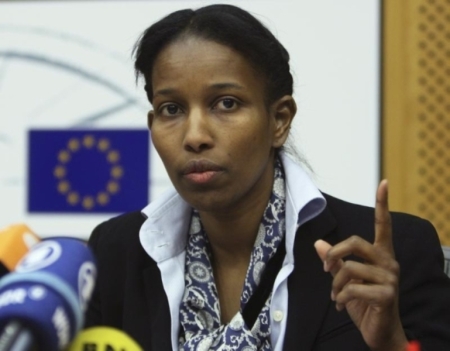Ayaan Hirsi Ali: America's Greatest 'Weakness' Against Radical Islamic Terrorism Is Political Correctness

Former Muslim and best-selling author Ayaan Hirsi Ali argued last week that political correctness in the West is making it harder for the United States and other Western nations to combat the rise of radical Islamic terrorism and its political philosophy.
The 46-year-old Ali, who grew up in a Muslim family in Somalia, suffered female genital mutilation and eventually fled to Holland after her father tried to force her to marry a distant cousin, participated in a panel discussion last Friday at the Conservative Political Action Conference in Maryland.
Ali, who is an atheist after renouncing her Muslim faith in 2002 and has authored four books critical of Islam, warned that concerned citizens in the West must not be afraid to speak out and tell the truth about radical jihadis whom she claims are following the Islamic political doctrine established by the Islamic prophet Muhammad in Medina.
While millions of Muslims across the world are moderate and do not follow extremist calls for jihad against nonbelievers, many in today's politically correct Western society are quick to label anyone who associates terrorist groups like the Islamic State, Boko Haram or al-Qaeda with the religion of Islam as "Islamophobes."
"To discuss Islam as a set of ideas does not make you a racist," Ali stressed. "It doesn't make you Islamophobic."
While the Obama administration has been reluctant to associate religion with the inspirations of Islamic terrorist groups, Ali argues that leaders who refuse to acknowledge the religious inspirations behind Islamic terrorist groups are only insulting the intelligence of their constituency.
"I grew up as a Muslim in a Muslim household and anytime anyone of our leaders tells me on television or in person that Islam is a religion of peace, my intelligence is insulted," Ali, who carries dual Dutch and American citizenship, said. "Islam is a religion but it is also a political doctrine, and you will not be able to name the threat precisely unless you understand exactly what Islam is."
Ali explained that when the Muhammad went to Medina in 622, he created a "political philosophy" that "is the antithesis of the idea of America" and "American political theory and practice."
"Millions and millions and millions of Muslims are peace-loving but those Muslims who invoke the prophet Muhammad in his legacy in Medina and in his creeds, those are a threat to us on a personal level," Ali stated. "They are not only lone wolves, they are state actors organized in the organization of Islamic cooperation."
"If we the people do not educate ourselves on Muhammad in Medina then we will not get that Medina agenda," Ali added. "Whatever happens to us and whoever commander-in-chief becomes it is our fault."
Jim Hanson, executive vice president for the Center for Security Policy, weighed in, saying that political correctness is radical extremists' "biggest tool." Hanson brought up how a British politician was arrested in 2014 after he recited a passage that was critical of radical Islam from Winston Churchill's 1899 book The River War.
"That man is a perfect example of what the other team wants to do to us," Hanson said. "They will suppress speech critical of Islam because if you can't talk about what they are doing, they can get away with it. The thing to do is talk about it. … Don't be scared by what the other folks call you. You are not a hater, you are not an Islamophobe. You are a freedom-loving American."
Ali agreed with Hanson's assessment that radical extremist groups are using political correctness in the West to their advantage.
"It is true that political correctness is literally eroding our systems from within and killing it. Radical Islamists are, obviously, exploiting that," Ali added. "They have defined us as the enemy and we haven't defined them as the enemy. They are exploiting our weaknesses and political correctness is our weakness."





















